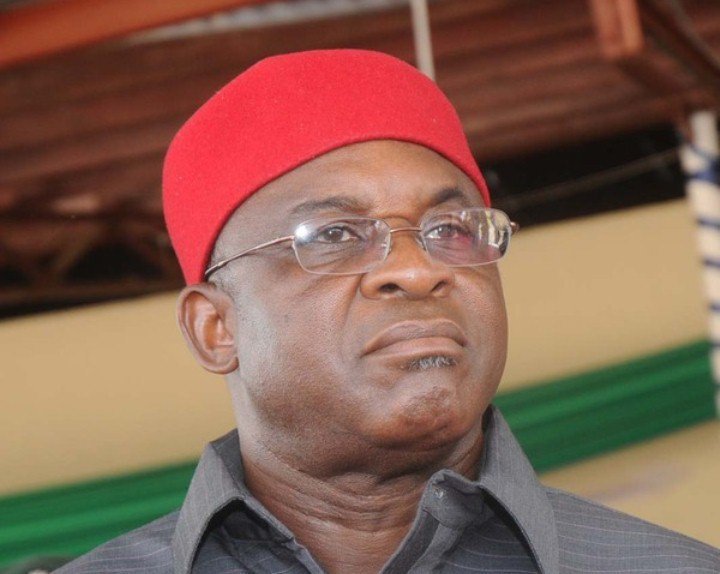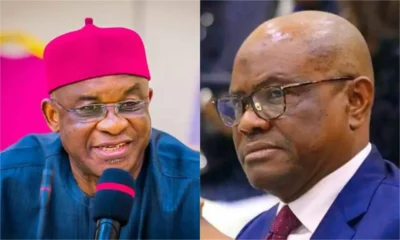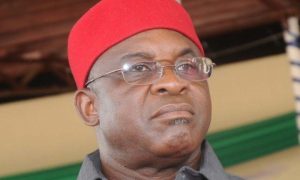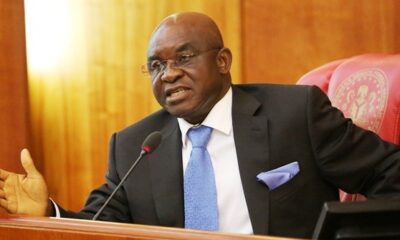Nigeria News
IBB reveals roles of David Mark, others in annulment of June 12 election, interim govt

Former Military President, General Ibrahim Badamasi Babangida (rtd.), has shed new light on the events surrounding the annulment of the June 12, 1993, presidential election and the formation of the Interim National Government (ING).
In his newly released autobiography, A Journey in Service, Babangida detailed the behind-the-scenes deliberations within the military and political circles, revealing how Brigadier David Mark and other senior officers played key roles in navigating the crisis.
He admitted that the annulment could not be reversed due to internal opposition within the military, leading to the eventual establishment of the ING.
He wrote,:
CUTELY AWARE that a General could not lead an army in disarray, I went back to the drawing board to devise a new plan, no matter how irresolute it may be. The National Defence and Security Council (NDSC) repeatedly met to map a way out of the dilemma we had found ourselves in.Having failed to sell the idea of fresh presidential elections to the two political parties, SDP and NRC, and faced with the fact that the annulment could not be rescinded because of the scary opposition to it within sections of the topmost hierarchy of the military leadership, the idea of an Interim National Government (ING) gained some traction within and outside the government.
Faced with a frighteningly daunting alternative, we were forced on July 31, 1993, to inaugurate a Tripartite Committee headed by Vice-President Augustus Aikhomu, comprising representatives from the Federal Government and the two political parties. While the NRC was represented by Adamu Ciroma, Eyo Ita, John Nwodo, Tom Ikimi, and Bashir Dalhatu, the SDP team was made up of Major-General Yar’Adua, Dele Cole, Joseph Toba, Olusola Saraki, Jim Nwobodo, Abubakar Rimi, and Dapo Sarumi.
Admiral Aikhomu headed the Federal Government team, which included Lt-General Joshua Dogonyaro, Lt-General Aliyu Mohammed Gusau, Brigadier David Mark, Brigadier Anthony Ukpo, Brigadier John Shagaya, Ernest Shonekan, Clement Akpamgbo, and Abdulrahman Okene. On August 2, Lt-General Ibrahim briefed some senior officers at the Command Mess in Lagos to fully prepare the military.
After several protracted deliberations covering a wide range of topics, the NDSC, in close collaboration with representatives of the two political parties, in March 1994, settled for an Interim National Government (ING). Without question, the idea of an ING was a contraption, something of a compromise between the fierce Abacha-led opposition to the June 12 election results and the position that the election results be allowed to stay—one that would succeed our government after the August 27, 1993, exit date.
To legally actualize that decision, the government directed Professor Ben Nwabueze and Clement Akpamgbo to draft an enabling law, Decree 61 of 1993, the legal framework for the ING.
Although the political parties had suggested a few other names for the headship of the ING, we, as a government, were okay with letting the Transition Council Chairman, Chief Ernest Shonekan, head the ING. Desirous of not being a stumbling block of any type, and as a personal sacrifice, on August 17, 1993, I announced my desire to ‘step aside’ and go into retirement during my address to a joint sitting of the National Assembly.
The outgoing government also felt that it would be proper for the Service Chiefs to retire, namely Lt-General Ibrahim, Air Vice-Marshal Akin Dada, Vice-Admiral Dan Preston Omatsola, and Aliyu Attah.One didn’t need to be a soothsayer or an astute political scientist to see that Chief Shonekan would have a tough time on the job. Although a former Chief Executive of UAC/Unilever, I feared he might lack the political astuteness to handle the impending national challenges.
The situation was further complicated because, like Abiola, Shonekan was an Egba-Yoruba, which meant the new Interim Government would be unpopular in Abiola’s strongest hold, southwestern Nigeria.






















